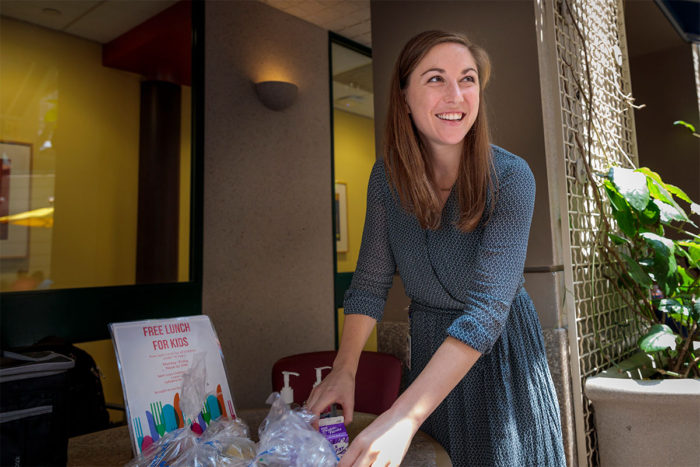Pediatric resident physician starts free summer lunch program
More than 1,100 meals served at St. Louis Children's
 Matt Miller
Matt MillerSarah Shelton, MD, a pediatric resident physician, distributes free lunches to kids this summer at St. Louis Children's Hospital. Shelton started the program to combat childhood hunger by partnering with Operation Food Search, a community outreach organization.
Summer is the hungriest time of year for many of the 13 million children who rely on school for food through the free or reduced-price meal program sponsored by the U.S. Department of Agriculture.
“There is an unbreakable link between access to basic human needs and the health of an individual patient,” said Sarah Shelton, MD, a third-year pediatric resident at St. Louis Children’s Hospital. “It is a socioeconomic issue, but I see a direct impact on the health of my patients and their families. If you’re hungry, it’s harder to be healthy.”
The hungry children she treats compelled her and Washington University School of Medicine to partner with Operation Food Search, a food bank serving metro St. Louis, to provide free, weekday lunches for children 18 and under who visited St. Louis Children’s this summer. Recipients included children with outpatient appointments or procedures as well as siblings, relatives, or friends of a patient in the hospital or who had a specialty doctor’s appointment, lab work or X-rays.
The inaugural program — which began in June and ran until mid-August — served 30 to 40 meals per day from noon to 1 p.m. near the hospital’s cafeteria.
A $2,000 grant through the pediatric residency program allowed Shelton to buy refrigerators for the meals. Staff nutritionists helped create well-balanced meals. Faculty, students and other pediatric resident physicians enthusiastically volunteered. “We work well together because we agree on the importance of also addressing our patients’ fundamental health needs outside of the hospital,” Shelton said. “We hope to continue this program for summers to come.”
Shelton’s efforts reinforce the School of Medicine’s emphasis on community outreach, said Andrew J. White, MD, who directs the SLCH residency program and is the school’s James P. Keating, MD, Professor of Pediatrics and vice chair of medical education. “Dr. Shelton’s project exemplifies our ongoing commitment to helping the children in the St. Louis area above and beyond the ear infections, pneumonias and broken bones,” he said. “Food insecurity is an under-recognized and underappreciated contributor to child health. I’m pleased to see our young doctors working to combat this issue.”
One of Shelton’s mentors, Katie Plax, MD, the Ferring Family Chair of Pediatrics at St. Louis Children’s Hospital and the School of Medicine, said partnering with community agencies such as Operation Food Search results in better medicine. “It allows us as doctors to use best medical practices and share in a mission that impacts kids’ health and well-being on a deeper, broader and more meaningful level,” Plax said.






